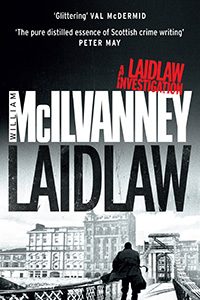
Find Your Local Library
To see where your nearest library is, browse its opening hours or contact it directly, please select it from the drop-down list below.

 Laidlaw, as a classic of Scottish Noir literature, did suffer from being somewhat dated, particularly in relation to its attitudes to gay men, and it was littered with stereotypes of The Gay Man, The Big Man and the people trying to be Big Men; the women came off rather badly, being scanty at best, somewhat derogatory at worst, serving mainly as plot-props – for example, we got very little notion of the murdered girl as an actual person. This is quite odd, because in general his ability to draw in-depth and complex characters was masterful. Some of the passages describing the various characters – including the minor ones, like the staggering drunk in the bar – were absolutely brilliant; and the way he treated ‘Glasgow’ as a character in itself was probably the first time it had been done. And the Glasgow banter was excellent, if a little overwrought in places.
Laidlaw, as a classic of Scottish Noir literature, did suffer from being somewhat dated, particularly in relation to its attitudes to gay men, and it was littered with stereotypes of The Gay Man, The Big Man and the people trying to be Big Men; the women came off rather badly, being scanty at best, somewhat derogatory at worst, serving mainly as plot-props – for example, we got very little notion of the murdered girl as an actual person. This is quite odd, because in general his ability to draw in-depth and complex characters was masterful. Some of the passages describing the various characters – including the minor ones, like the staggering drunk in the bar – were absolutely brilliant; and the way he treated ‘Glasgow’ as a character in itself was probably the first time it had been done. And the Glasgow banter was excellent, if a little overwrought in places.
The two main problems with the book were
and B)
The quasi-philosophical asides that were at first insightful, clever and interesting, but as the book went on become more and more obscure until they became practically nonsensical and ended up tripping up the momentum of the plot.
Here’s an example that’s teetering on the brink:
The bleak, empty room they stood in was for Harry a kind of natural precipitation of their experience. It was their portion of the noise and busyness that was going on around them. In this moment there hardened in him the admission of a knowledge he had been a long time acquiring. He knew the viciousness of public virtue, how it subsists through the invention of its opposite. He made a simple rule for himself: unjust suffering eventually writes a blank cheque for the sufferer. They would collect theirs.
Doesn’t exactly push you on!
But for a debut novel that (sort of) broke a mold we all agreed that it was a worthwhile book to read, that it had sparks of brilliance, even if the sum of its parts didn’t sweep us off our feet.
Publisher: Canongate
ISBN: 9780857869869